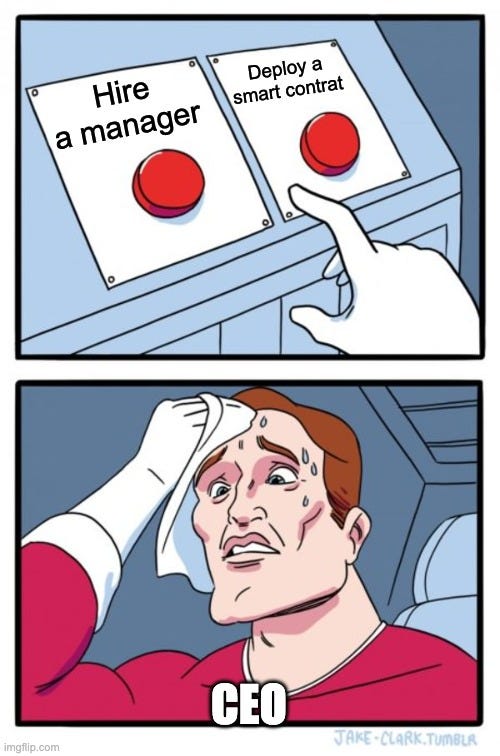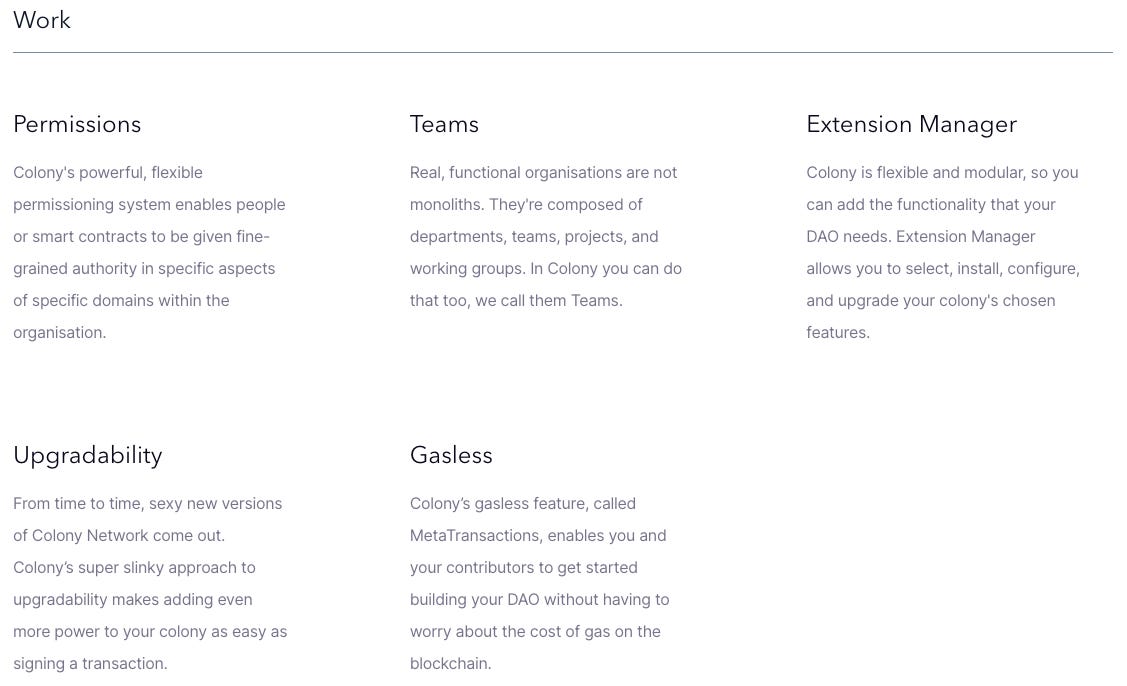🦸🏻From zero to hero: organize a stellar web3 project like NFT Paris !
And can smart contracts replace Managers? 🤖
Today's Agenda...
A masterclass on building a premier Web3 event with NFT Paris co-founder 🌐
Exploring how smart contracts could automate managerial tasks and transform traditional management practices 🤖
⏰ Reading Time: 6 min
Join the Web3 Leaders Community
Masterclass : Organizing a major event like NFT Paris – Insights from Côme Prost-Boucle
Organizing a large-scale event such as NFT Paris demands meticulous planning, strategic networking, and an unwavering commitment to the vision. Drawing from the experiences of Côme Prost-Boucle, co-founder of NFT Paris, this masterclass provides a comprehensive guide to successfully organizing an impactful event in the web3 space.
Romain's interview with Côme on his Behind The Chain podcast led to the article below.

1. Start with a Grand Vision
The foundation of NFT Paris was built on the ambition to create a premier event for the web3 community in Europe.
"From the beginning, we aimed high and gave ourselves the means to achieve our ambitions," says Côme.
Securing a prestigious venue like the Grand Palais éphémère was not an easy task, requiring four months of lobbying. However, this bold move significantly elevated the event's stature and appeal.
2. Build a strong network and community
One of the core principles that contributed to the success of NFT Paris was the establishment of a robust network. Initially, Côme and his co-founder, Alexandre Tsydenkov, organized small meetups in bars and cafes, starting with 30 attendees and gradually growing.
"We decided to create our own community to meet local builders and investors," explains Côme.
This grassroots approach laid a solid foundation for larger gatherings.
3. Stay authentic and focused
Maintaining authenticity and a clear vision was crucial. Côme emphasizes the importance of quality over quantity. Unlike other events with numerous stages and speakers, NFT Paris focused on a single main stage featuring top names in the industry.
"We aimed for a highly curated and qualitative experience," he notes, ensuring that every aspect of the event aligned with their original vision.
4. Adapt and evolve
Adapting to technological advancements and market trends is vital for staying relevant. Initially focused on digital art and NFTs, NFT Paris expanded its scope to include various use cases like gaming and decentralized social networks. Côme highlights the importance of evolving with the ecosystem, stating :
"We continued to grow and stay pertinent by following the evolution of technology applications."
5. Leverage strategic partnerships and sponsorships
Forging strategic partnerships and securing sponsorships can significantly enhance the event's profile. For NFT Paris, involving high-profile individuals and organizations from the outset was key. The presence of influential figures like Brigitte Macron, Sebastien Borget, Yat Siu, etc and representatives from major corporations added credibility and drew significant attention to the event.
6. Create an engaging and diverse program
An engaging program that caters to a wide audience is essential. NFT Paris featured a mix of art, technology, and business, attracting diverse attendees from different sectors. Côme points out :
"We had a broad panel of media coverage and included institutional participation, which broadened our event's appeal."
7. Focus on long-term growth and innovation
Sustained success requires a focus on long-term growth and innovation. Organizing hackathons and collaborating with local developers can foster innovation and keep the event fresh. Côme mentions that engaging builders and developers was a key strategy for NFT Paris, ensuring continuous evolution and relevance.
8. Manage logistics and operations efficiently
Effective logistics and operations management are critical, especially when dealing with large-scale events. Overcoming challenges such as the COVID-19 pandemic required resilience and flexibility. Despite the difficulties, NFT Paris managed to attract 1000 attendees in its first edition at Station F, showcasing their operational capabilities.
9. Engage with the community beyond the event
Maintaining engagement with the community beyond the event helps in building lasting relationships. NFT Paris did not just focus on the annual event but also created a year-round community through regular meetups and collaborations.
Conclusion
Organizing a major event like NFT Paris involves dreaming big, building strong networks, staying authentic, adapting to changes, leveraging partnerships, creating engaging programs, focusing on innovation, managing logistics efficiently, and maintaining community engagement. As Côme humorously put it :
"We aimed for the moon, and if we missed, we still landed among the stars."
Can smart contracts replace Managers? 🤖
The rise of smart contracts is challenging many facets of the economy : finance, insurance, cultural creation, etc., but it also challenges areas that we are less familiar with, such as management. These self-executing contracts, running on blockchain platforms like Ethereum, promise to automate many tasks traditionally handled by managers. But can they truly replace human managers ?
Reminder : what are smart contracts? 🤔
Smart contracts are automated programs that execute predefined actions when certain conditions are met. They ensure trustless, transparent operations without the need for intermediaries.
Imagine a freelance writer's contract. The agreement is that the writer will be paid $500 once they submit a completed article. Traditionally, a manager would review the article, approve it, and then process the payment. With a smart contract, this process is automated:
The writer submits the article to a predefined system.
The smart contract checks if the article meets the predefined criteria (e.g., word count, topic relevance).
If the criteria are met, the smart contract automatically releases the payment to the writer’s account.
In theory, they can take over many managerial tasks, but how does this work in practice?
Automating Managerial Functions
Task Assignment, Workflow and Payment Automation ⚙️
Colony is a platform that uses smart contracts to automate task assignment, workflow and payment management. In a traditional company, a manager assigns tasks, tracks progress, and ensures deadlines are met. Colony’s smart contracts do a lot of this automatically. This reduces the need for a manager to micromanage the team.
Arbitration Management 💼
Kleros is a solution which utilizes smart contracts to handle arbitration and reward distribution. For example, in a freelance marketplace, Kleros’ smart contracts can automatically release payments to workers once predefined criteria are met and verified. This ensures fair compensation without the need for a manager to oversee each transaction.
Decentralized Governance and Decision-Making 🗳️
DAOs, such as DAOhaus, empower community members to participate in decision-making processes through smart contracts. For instance, instead of a centralized board of directors determining project direction, DAO members propose and vote on proposals autonomously. Smart contracts then execute the chosen outcomes, ensuring transparency and removing the need for hierarchical management structures. This decentralized approach fosters inclusivity and empowers stakeholders to shape the organization's trajectory collaboratively.
Challenges and Limitations 🚧
Smart contracts are transforming management by automating routine tasks, ensuring compliance, and decentralizing decision-making.
However, they are not yet capable of fully replacing human managers. They lack the ability to handle nuanced human interactions, such as conflict resolution and motivational leadership.
The future of management in web3 likely involves a hybrid approach, where smart contracts handle the automation, and human managers focus on strategic, complex, and interpersonal aspects of leadership.
Additionally, coding smart contracts to cover every possible scenario can be complex and prone to errors, which can lead to costly consequences. For instance, in 2020, a bug in the Compound smart contract led to $90 million worth of COMP tokens being accidentally distributed to users.

If you like our work, feel free to like and comment.
Follow us on Linkedin to keep up with all our news.
Disclaimer : The goal of this newsletter is to inform and produce content related to management in the world of Web3. It is not investment advice. Investments in crypto-assets and NFTs are risky and can result in the loss of your entire capital. Always conduct your own research and exercise caution.






